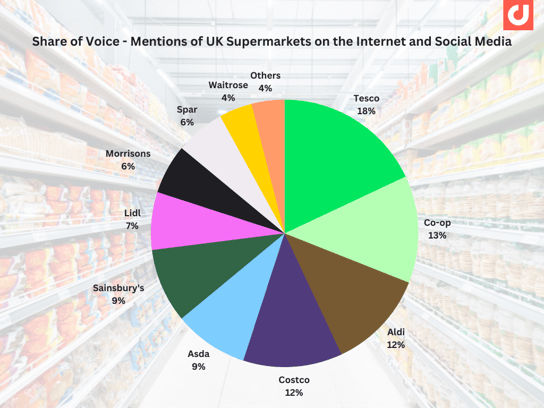Analysing the Share of Voice: A Snapshot of UK Supermarkets in the first Semester of 2023
In today's digital age, social media and online platforms have become essential arenas for brands to connect with their audience. The supermarket industry is no exception, with major players striving to establish a strong presence and engage customers effectively.
Digimind leveraged its powerful tool, Digimind Historical Search, to analyse data from the first and second quarters of 2023 in order to uncover valuable insights about the UK's top 20 supermarkets.
Who's Dominating the Digital Conversation?
During our analysis, we collected a substantial number of 3,515,001 mentions related to the top 20 supermarkets in the UK, namely Tesco, Aldi, Lidl, M&S, Asda, Iceland Foods, Sainsbury's, Morrisons, Co-op, Waitrose, Spar, Costco, Farmfoods, Costcutter, Netto, One Stop, Heron Foods, Whole Foods, Londis, and Premier Stores. In evaluating the share of voices, the following pattern emerged:

Tesco - 18%: Tesco leads the pack, commanding a significant share of voice on social media and the internet. Its strong market position and wide customer base contribute to its prominent presence.
Co-op - 13%: Co-op secures the second position with a substantial share of voice, emphasizing ethical sourcing, sustainability, and community involvement.
Aldi - 12%: Aldi follows closely behind. Its emphasis on affordability and fresh produce attracts a loyal customer base.
As depicted in the dynamic bar chart above, Aldi swooped in and claimed a top spot at the end of the second quarter. How did they do it? By announcing their plans to expand their vegan offerings to a whopping 1,000 products by 2024. Aldi's rise to the podium marks a significant shift in the supermarket landscape, capturing the attention of eager shoppers seeking plant-based options.
Supermarkets’ Hot Topics
In the first quarter, social media buzz centered around key issues affecting supermarkets. Frustrated shoppers took to platforms to voice their complaints about the scarcity of salad items, as Morrisons and Tesco struggled to meet demand. Extreme weather conditions in Spain and Africa disrupted harvests, prompting Asda and Morrisons to implement purchasing limits on certain fruits and vegetables. A shopper's experience encapsulated the sentiment, sharing their unsuccessful search for tomatoes across Tesco, Aldi and Waitrose, emphasising the shortage's magnitude.
Meanwhile, the impact of Brexit on the retail sector became increasingly evident, with former Sainsbury's boss highlighting the consequences on trade and domestic production.
These first-quarter conversations shed light on the challenges faced by supermarkets and the wider implications of these issues.
During the second quarter, social media discussions revolved around pressing topics that captured public attention. Contamination concerns surfaced, with questions raised about the handling of produce in Asda stores. The hashtag #BoycottTesco and #BoycottAsda gained traction, indicating a growing sentiment of consumer activism.
Worker pay came into focus as Asda proposed pay cuts for 7,000 employees. Critics highlighted the issue of profiteering and the need for stronger protections to ensure fair pay and workers' rights, such as banning fire and rehire practices.
The rising cost of food items, including meat, yogurt, and vegetables, garnered attention. Concerns were raised about significant price increases compared to the previous year, impacting consumers' wallets. Supermarkets like Tesco and Lidl were specifically mentioned, adding to the public discourse surrounding affordability and access to essential food items.

Additionally, the growing interest in insect consumption found its way into the conversation, with Lidl's reported involvement in exploring the incorporation of insects as a food source. This development aligned with the recent approval of insects for human consumption by European authorities, signaling a potential shift in food trends.
These conversations reflect consumer expectations for safety, fairness, and accessible pricing in the supermarket industry.
Lastly, one recurring concern voiced by consumers revolves around self-checkout systems, with the perception that they are performing tasks typically carried out by supermarket employees without compensation. This viewpoint highlights the tension between convenience and the importance placed on human interaction during the shopping process.
These insights highlight the importance of understanding consumer preferences and addressing concerns. Social listening tools like Digimind enable supermarkets to actively monitor and engage with consumer sentiments, adapt to emerging trends, and make informed decisions. By leveraging Social Listening, supermarkets can enhance their brand reputation, offer improved experiences, and foster stronger connections with customers.
In a dynamic industry where consumer expectations continue to shape the market, understanding and responding to consumer sentiments is paramount.
Written by Silvia Bizzarro
Silvia is a Business Development Representative at Digimind, residing in the vibrant city of Amsterdam. With a master's degree in Marketing Management, she's totally hooked on everything marketing-related. What really gets her excited is diving into the possibilities of AI and how it can take consumer behaviour insights to a whole new level.

